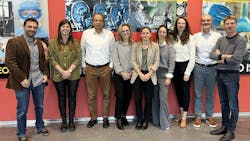New R&D collaboration seeks to improve CGT manufacturing
Diagnostic imaging firm Bracco Imaging and Limula, a life science tools company specializing in automated cell and gene therapy manufacturing, are partnering on an R&D project to develop an alternative to conventional magnetic beads for affinity-based cell selection and activation.
The partnership will combine two innovations: lipid-based microbubble technology from Bracco and automated cell processing technology from Limula, according to the companies.
“Integrating Bracco’s microbubble technology — clinically used for over two decades in imaging — with Limula’s instrumentation offers a compelling approach to improved cell manufacturing, aiming to accelerate access to more affordable therapies for a broader patient population,” Thierry Bettinger, director of the Bracco Research Centre Geneva, said in a statement.
Some of the anticipated advantages of the unique lipid formulation provided by Bracco combined with the cell processing technology developed by Limula include traceless reagents that can be easily removed from the cell product during the manufacturing process, significantly simplifying quality control, as well as gentle manipulations of the cells leading to better yields, purity, and overall product quality.
The R&D project is being conducted in collaboration with Professor Nicola Vannini, an expert in T-cell metabolism at the University of Fribourg, Switzerland.
“We see tremendous potential in innovative approaches to some of the key cell manipulation steps require to deliver improved patient outcome,” Vannini, who is contributing his expertise in T-cell physiology and metabolism as part of this project, said in a statement. “My team is looking forward to evaluating the impact of these new technologies on the fitness of the cell products.”
Cell and gene therapies represent a revolution in medicine, with CAR-T and other cell therapies are already transforming the lives of cancer patients worldwide, according to the announcement. The global market is expected to exceed $100 billion by 2034.
However, the complex manufacturing of these treatments remains a bottleneck to their widespread adoption in the clinic. Cell selection and activation are critical steps in these processes, often followed by genetic manipulations.
“This partnership reflects the need for a multidisciplinary approach to innovation in Cell and Gene Therapy,” Luc Henry, CEO of Limula, said in a statement. “Our collaboration with Bracco and Prof. Vannini will provide us with the complementary expertise needed to deliver value to our biopharma and hospital customers.”
The collaboration is funded through an innovation project grant from the Swiss Innovation Agency Innosuisse.
